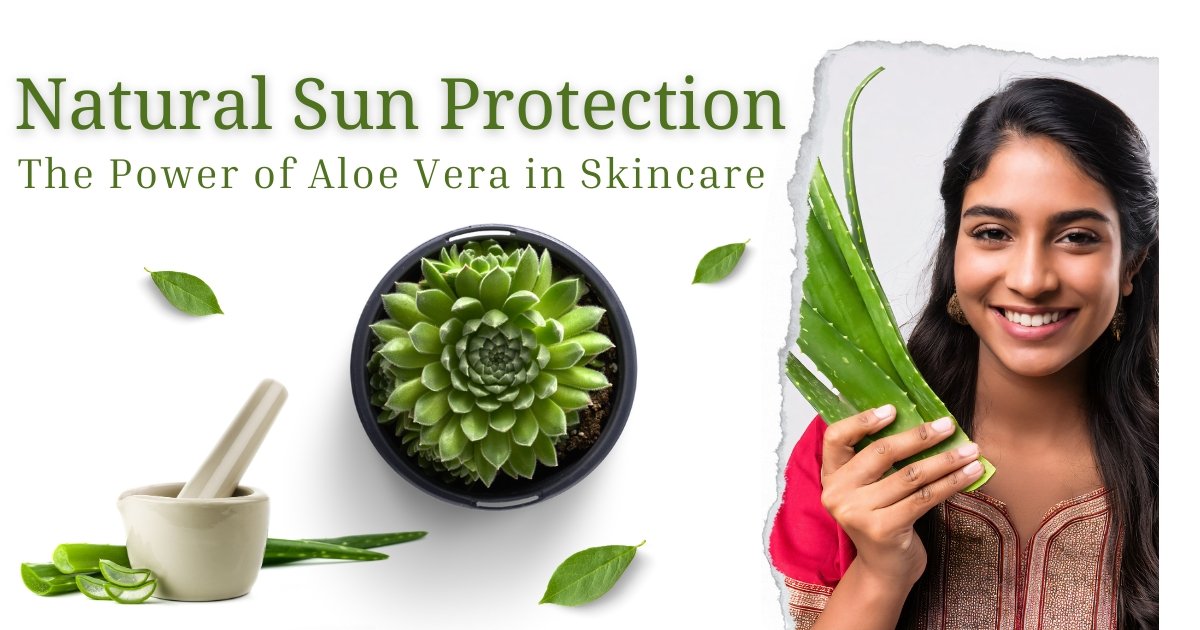In a world full of chemical-laden sunscreens, nature offers its own gentle protector—Aloe Vera. Revered for centuries as a healing and hydrating plant, aloe vera is now gaining recognition for its role in natural sun protection and after-sun skincare. Whether you’re someone with sensitive skin, prefer plant-based beauty, or simply want to switch to safer alternatives, this blog dives into the powerful benefits of aloe vera in safeguarding your skin under the sun.
Why Sun Protection Is a Daily Essential
Before we dive into the wonders of aloe vera, it’s important to understand why sun protection is non-negotiable in skincare. The sun emits UVA and UVB rays, both of which can cause:
- Premature aging (wrinkles, pigmentation)
- Sunburn and inflammation
- Skin dehydration
- DNA damage and increased risk of skin cancer
Even on cloudy days or during winter, UV rays penetrate the skin and contribute to long-term damage. Hence, sun protection isn’t seasonal—it’s daily.
Aloe Vera – Nature’s Cooling Shield
Aloe vera is a succulent plant that contains gel-like flesh packed with over 75 active compounds, including:
- Vitamins A, C, and E
- Enzymes
- Minerals like zinc and magnesium
- Polysaccharides (hydrating sugars)
- Amino acids and antioxidants
These nutrients work together to soothe, hydrate, and protect the skin from external stressors like sunlight and pollution.
Does Aloe Vera Protect Against UV Rays?
Aloe vera contains compounds like aloin and aloe-emodin, which have been found to absorb UV radiation to some extent. While it cannot replace SPF-rated sunscreens entirely, aloe vera acts as a natural barrier that supports the skin’s defense mechanisms in multiple ways:
- Forms a Protective Layer
The gel creates a light coating on the skin that deflects mild UV rays and keeps the skin shielded from harsh heat.
2. Reduces UV-Induced Inflammation
Sun exposure can cause skin redness, irritation, and inflammation. Aloe vera’s anti-inflammatory properties help calm these reactions instantly.
3. Prevents Moisture Loss
Dehydration from sun exposure leads to dull, flaky skin. Aloe’s hydrating sugars (polysaccharides) lock in moisture and strengthen the skin’s barrier.
4. Neutralizes Free Radicals
Aloe vera is rich in antioxidants, which fight free radical damage triggered by UV exposure—slowing aging and maintaining skin elasticity.
How to Use Aloe Vera for Natural Sun Protection
While aloe vera is not a standalone sunscreen, it can be a fantastic complement to your sun care routine, especially when paired with physical sunscreens or used post-sun exposure.
- Daily Moisturizer with Aloe Vera
Apply pure aloe vera gel after cleansing your face in the morning. It creates a breathable shield and works well under mineral sunscreen or makeup. - Aloe Vera Cooling Mist
Dilute aloe gel in rose water and store in a spray bottle. Use this mist throughout the day to keep your skin cool and protected under the sun. - Aloe & Turmeric Pre-Sun Mask
Mix aloe gel with turmeric and sandalwood powder. Apply 15 mins before heading out to reduce UV-induced redness and inflammation. - After-Sun Soothing Pack
Blend aloe vera with cucumber juice and apply to sun-exposed skin after outdoor activity. It reduces burning, inflammation, and peeling.
Aloe Vera vs. Chemical Sunscreens
| Feature | Aloe Vera | Chemical Sunscreen |
| Ingredients | 100% Natural | Synthetic filters like oxybenzone, avobenzone |
| Skin Reaction | Gentle, soothing | Can cause irritation or clogging |
| UV Defense | Mild UVA/UVB support | High SPF rated protection |
| Best For | Sensitive, dry, mature skin | High-exposure needs like beaches |
| Eco-Friendliness | Biodegradable | Some cause coral reef damage |
While aloe vera isn’t a substitute for SPF 30+ sunscreens, it is a natural shield that makes an excellent base layer or aftercare treatment—without the long-term risks of chemical overload.
Ideal for Mature, Dry & Sensitive Skin
Aloe vera’s antioxidant and hydrating properties make it a hero for:
- Mature skin – Boosts elasticity, reduces photoaging
- Dry skin – Deeply hydrates and locks in moisture
- Sensitive skin – Soothes redness and inflammation
- Acne-prone skin – Heals without clogging pores
Its ability to rebuild the skin barrier and reverse early signs of sun damage makes it a go-to ingredient for anyone wanting clean and effective skin protection.
Things to Avoid While Using Aloe Vera
To maximize aloe vera’s sun protection benefits:
- Do not rely on aloe vera alone in harsh sun or during long outdoor hours—always layer SPF.
- Avoid store-bought aloe gels with added alcohols or fragrances—they can dry or irritate your skin.
- Always do a patch test to rule out any allergies, especially if you’re using fresh aloe straight from the leaf.
Final Thoughts: Aloe Vera Is Nature’s Skincare Armor
From cooling sun-exposed skin to forming a gentle UV defense, Aloe Vera has earned its place in any natural skincare routine. It may not replace your sunscreen entirely, but it enhances your skin’s resilience, moisture, and glow—especially in India’s harsh weather conditions.
Whether you apply it as a moisturizer, mix it into face packs, or use it post-sun, aloe vera is the herbal solution that protects while it heals. Choose pure, chemical-free aloe vera products for best results—and let your skin breathe and shine the natural way.
Looking to embrace plant-powered skincare?
Check out our Aloe Vera Powder and other 100% natural skin and hair care products at K Somu Chetty & Co—crafted with purity, tradition, and care.



